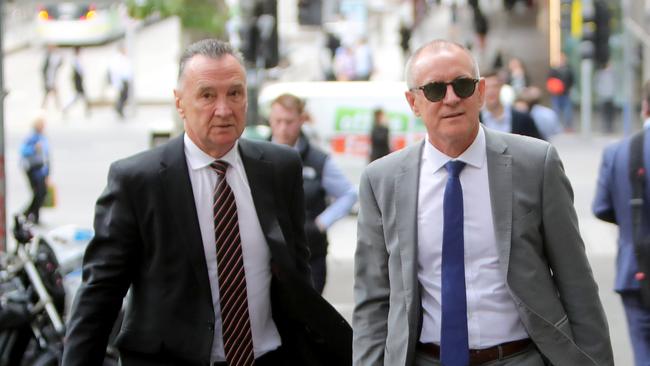ALP review: Muddle scared blue-collar voters
Labor stalwarts Jay Weatherill and Craig Emerson have identified why Labor lost the election: their report paints a dismal picture.

It was the improbable winner inquiring into the unexpected loser — former South Australian Labor premier Jay Weatherill, who defied expectations to win Labor a shock fourth successive term at the 2014 poll, examining the dismal failure of Bill Shorten and Labor at an election where victory was seen as a formality.
Aided by Gillard government minister Craig Emerson, Mr Weatherill spent the past six months running the ruler over federal Labor’s many failings at this year’s poll, where its frontbenchers were so confident of victory they were all but packing boxes for the move into the ministerial wing.
The scope of the report and the breadth of its findings stands in contrast to the simple tactics Mr Weatherill used to stay in power and let Labor rule for an unprecedented 16 years in South Australia, where he tagged himself “Jay for SA” and borrowed big to pay for infrastructure while campaigning negatively against the Liberals on the grounds of job security and reduced services.
This basic approach was a world away from the ambitious, unwieldy and poorly marketed agenda of federal Labor this year, providing Mr Weatherill and Dr Emerson with a target-rich environment in assessing where Labor went wrong.
Miserably enough for Labor, the answer was: almost everywhere. Too many policies, few of them properly explained, a campaign without a reverse gear, muddled messaging, divisive class war rhetoric, all of it combining to result in a the collapse of the blue-collar vote, the alienation of Christian and Chinese voters, overseen by a leader many people didn’t like.
As report cards go, they don’t come much more brutal than this.
And, for a party built around championing the interests of the working class, its most devastating finding is it was the workers who ditched them.
“Absolutely,” Mr Weatherill told The Australian in an exclusive interview after the release of the review yesterday.
“We didn’t persuade them that we were on their side. They are seeing jobs disappear out from beneath them, they’re seeing their wages stagnate and, even though many of our policies were designed to help them, they frightened them. They thought we were going to smash the economy.
“These were people who are most vulnerable in a collapsing economy and the Libs were able to portray our policies as putting them most at risk.”
Mr Weatherill said the complexity of Labor’s failure this year and its challenge is that it didn’t just lose low-paid blue-collar and clerical workers but the more cashed-up workers in the mining and heavy manufacturing sector, who were fearful of the party’s policies on climate change.
As a premier who championed ambitious emission reduction targets, nascent and untested renewable projects and presided over the closure of a coalmine — yet still won a fourth term — Mr Weatherill believes federal Labor failed to sell the job-related benefits of the renewables sector or the existential threat from failing to act on climate change: “At the moment, people think the costs of inaction on climate change are lower than the costs of action.
“That’s a challenge to communicate that the costs of inaction are profound and will ultimately affect people’s livelihoods and lives. We need to stress too the job opportunities that exist in a low-carbon economy. Workers need to feel that we are on their side.”
The paradox is the very people who stood to lose the most from Labor’s policies at this year’s poll — middle-class voters who wanted more generous tax cuts or who may have derived some of their income from investment properties and franking credits — voted for Labor in increased numbers.
“They didn’t just stick with us, they swung towards us, although not enough,” Mr Weatherill said.
“It was working people who drifted away and they did so principally because we didn’t convince them about our capacity to manage the economy. The arguments we were putting about our improvements to the health and education system really mean very little if you don’t have a job.”
He said Labor was particularly vulnerable on the economy question because of the simplicity of Scott Morrison’s campaign.
“There was no coherent message,” Mr Weatherill said
“There were lots of different messages that we didn’t stick to. Most people couldn’t give you a clear answer about what the strategy was, and if they did give you a clear answer, they didn’t give you the same answer.
“Meanwhile the other fellow was crystal clear — a strong economy. It was quite an odd election. The opposition was trying to run on the value of its policies and the government was trying to run it as a referendum on the opposition.”
As far as a blueprint for Labor as it aims at the 2022 poll, Mr Weatherill said many of the recommendations are “almost elementary”, in terms of party organisation, tactics and messaging. But he admitted the hardest part would be solving the riddle of the defeat — the collapse of the blue-collar vote while the university-educated middle class swung favourably.
“It is not simple to knit these two constituencies together — people who are concerned about climate change and people who rely upon jobs in the coal industry. That’s a pretty diabolical question. We have to answer it properly.”




To join the conversation, please log in. Don't have an account? Register
Join the conversation, you are commenting as Logout